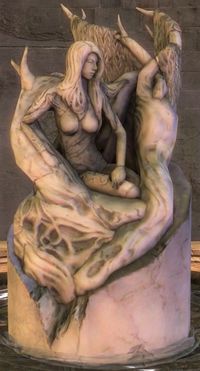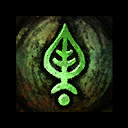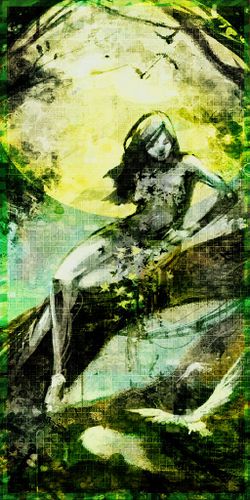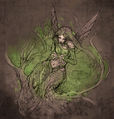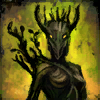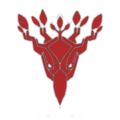Melandru
“In the presence of Melandru, I felt my weariness wash away, as if rejuvenated by the sweet embrace of Spring. Wherever she walked, the sun shone, and truly, I felt the beauty of life.
Melandru is the goddess of nature, earth, and growth.[1] Her deep connection to earth and nature gives her power over many living things, both flora and fauna.[2] Legends of the charr say that Melandru was the one who created Tyria (though this is false), and human legends say that she was the third of the Six Gods to arrive on the world. She is the oldest and wisest of the Six Gods, and, with Dwayna, attempted to bring peace to the races of Tyria.[2][3]
Melandru is often depicted as having a human female torso and a lower body made from wood. Statues of her are said to give healing and water to those with the favor of the gods. Before the Cataclysm, Orrians worshipped Melandru at the Cathedral of Verdance. In the present day the Church of Melandru worships the Goddess of Nature.
The quaggan revere a goddess named Mellaggan, who they believe has been killed by the krait. Human scholars believe this goddess to be a depiction of Melandru due to similarities between the two goddesses and the quaggan's using a sunken statue of Melandru as a makeshift shrine to Mellaggan. The quaggans would disagree with this interpretation, but are simply too polite to do so.[4][5] The norn refer to Melandru as a Spirit of Action.[6]
Biography[edit]
Life on Tyria[edit]
According to the Orrian History Scrolls, Melandru was the third god to arrive from the Mists and the oldest of the Six.[2] Although the gods were initially drawn to the magic of the Artesian Waters in the heart of Orr, they took humanity elsewhere and eventually led some humans to Cantha in 786 BE, planting the seeds of the first widely known thriving human civilization in Tyria—although there may have been other human civilizations beforehand based on suggestions of Cantha having been colonized multiple times.[7][8][9][10] With the urging of Balthazar, the God of War, humanity began claiming Tyria for themselves at the expense of the native Tyrian races. However, the natives resisted human expansion better than the God of War had expected. Despite this, humanity proved to be resilient and spread to Orr, Elona and beyond in the following centuries.
According to her scriptures, Melandru witnessed a tribe of godless humans led by Ewan senselessly destroying everything in their path as they wandered the land. She directly intervened by blocking their path with a wall of thorny branches and appeared before them in the shape of a large tree with the upper torso of a woman while introducing herself. The Goddess of Nature punished Ewan's tribe for the destruction they had caused by binding them to the land and transforming them into tree-like stewards of nature. At some point druids, a tribe dedicated to Melandru, appeared in the Maguuma Jungle and shed their physical bodies in a ritual to become arboreal spirits who would protect and nurture nature. Over the centuries others sought the druids out and joined their Henge.[11]
As Orrians worked on building the great city of Arah for the gods, Abaddon, the God of Knowledge, designed a set of magically warded reliquaries where the gods could keep their priceless and powerful artifacts, relics and knowledge safe from thieves and defilers. Melandru was given one of these reliquaries.[12] During this time the gods gathered various powerful and ancient artifacts from around the world, including the original Bloodstone and the Mystic Telescope, and brought them for safekeeping and study in Arah.[13] Members of the Church of Melandru dedicated themselves to the Goddess of Nature and worshiped her at the Cathedral of Verdance. Like other members of the Six, Melandru had a dirge dedicated to her which was sung by the Sirens of Orr.[14] In the Echovald Forest of Cantha, House Lutgardis of the Kurzicks were a family of great musicians, including the Tree Singers who would nourish the Forever Trees and create juggernauts, who became primarily devoted to Melandru.[7]
At some point the gods became aware of the existence of the hibernating Elder Dragons, who were tied to the magical balance of Tyria, and learned their names and spheres of influence. This information was documented in what would come to be known as the Scroll of the Five True Gods.[15]
The gods lived for a time among their followers in Arah. However, their radiance blinded mortals who gazed upon them for too long whenever the gods appeared among their followers. The gods eventually decided to retreat from public, and Dwayna commissioned the Orrian sculptor Malchor to make a statue of each god. As the statues were completed, the respective gods depicted in the statues retreated into Arah one by one.[16]
Around 48 BE,[17] the old and tyrannical God of Death, Dhuum, was overthrown by Dwayna's half-god son Grenth who ascended to godhood and was welcomed by the gods as the new member of the Six.
Exodus of the Gods[edit]
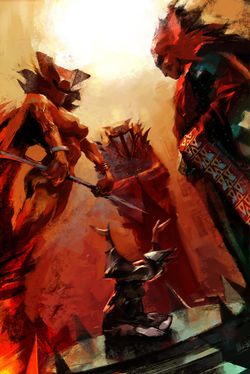
According to an ancient Ascalonian legend and an Orrian scroll, the gods formulated a magical ritual and gifted three holy artifacts needed to enact and reverse it—a magical crown, Balthazar's own sword Sohothin and its twin Magdaer—to the royal human lineage as protection against invasion. The artifacts, as well as the knowledge how to use them in the ritual, would eventually pass on to the Ascalonian line of human kings.[18][19]
In 1 BE, the Six decided to gift magic to the mortal races. The gift of magic made the mortal races greedy, however, and led to devastating wars. King Doric, who had become the ruler of Tyria's united human tribes, journeyed to Arah and asked for the Six to put an end to the bloodshed. According to the Orrian history scrolls, Dwayna in particular was greatly moved by the suffering the wars had caused and offered consoling words to Doric that would become the basis of teachings for the priesthood of Dwayna. In response to the king's plea, the gods shattered the original Bloodstone and divided the magic in the world into five lesser Bloodstones to prevent anyone from ever wielding power over all magic again. According to the History of Tyria, the gods sealed the stones with Doric's blood and placed his bloodline in charge of guarding the stones.[20]
Abaddon turned against his fellow gods because of a disagreement over the gifting of magic among many other escalating events that followed the sealing of the Bloodstones. The rebellious god and his army of Margonites were defeated after their failed assault; however, the gods' victory came at the cost of the Crystal Sea turning into the Crystal Desert and a once plentiful land becoming the sulfurous Desolation. Balthazar himself forged the chains that bound the fallen god in the Realm of Torment.
The Five realized the damage which the war against Abaddon and the gifting of magic from earlier had caused to the world and decided to leave humanity to stand or fall on its own merits without further meddling.[21] They departed from Tyria in 0 AE in an event known as the Exodus of the Gods. The Five entered the Mists and continued governing their respective realms from there although they did not sever their ties with Tyria completely as their power was still felt in the world for centuries to come. Melandru's connection to druids lessened, and they eventually lost contact with her.[11]
At some point, Wintersday traditions, centered on the rivalries of the gods and the changing of the seasons which would symbolically determine whether darkness or light would reign following the coming of the new year, emerged among humanity. Avatars of the gods appeared on Tyria and asked participants to choose which of the two teams to side with for the festive, annual competition which would decide whether Dwayna or Grenth won. Dwayna, who was supported by Melandru, fought to return spring to the land and bring joy to the hearts of humanity via renewed life, while Grenth, who was supported by Balthazar, fought to prolong winter and offered a less frivolous outlook on life and somber reflection on death as part of the circle of life.[22] These festivities also included the Great Snowball Fight of the Gods.
Around this time, Dwayna's magic created the first Brrrls, or snowmen, to spread Wintersday cheer and hand out gifts from the Secret Lair of the Snowmen, while Grenth's magic caused unfortunate victims to transform into the mischievous Grentches who would spread misery in their wake as well as steal and hide gifts of innocent children in remote locations such as the Underworld.[23][24]
Conflicts in the Mists[edit]
When Abaddon began Nightfall in order to break free from his prison, the gods chose not to intervene directly. However, the Five gave a blessing and words of encouragement to Spearmarshal Kormir's party via their avatars as the mortal heroes entered the Realm of Torment to defeat Abaddon once and for all.
|
After Kormir had successfully absorbed the vanquished Abaddon's rampant magic and ascended to godhood at the end of Nightfall in 1075 AE, the temporary spike in magic was enough to stir Primordus and begin the next cycle of Elder Dragon awakenings. Most of the gods advocated for severing ties with Tyria for good and leaving its inhabitants to face the calamity on their own as the gods' interference would only make matters worse. Balthazar vehemently disagreed with his fellow gods, however. Having been more or less idle since the Exodus, the God of War craved for action and was more than willing to accept the challenge of facing the Elder Dragons in combat in order to add their power into his own.[25] Disagreements led to arguments, and the angered Balthazar accused the other gods of being cowards and threatened to strike them down as well. Understanding that the God of War had to be stopped or his ambitions could lead to Tyria's destruction, the other gods joined forces and stripped Balthazar of his power, imprisoning him in the Mists where they intended to leave him in chains so he could never threaten anyone again. Balthazar felt betrayed and vowed to have his revenge on his fellow gods and make them scream their allegiance before he would end their lives and claim their power as his own.[26] The rest of the gods decided to continue with their original plan, leaving Balthazar behind and departing from their respective realms, with Melandru leaving her domain. The God of War remained imprisoned until 1328 AE when Rytlock Brimstone happened upon his location while searching for the missing sword Sohothin. Balthazar reignited the sword, and the grateful Rytlock severed the fallen god's chains without realizing who the mysterious prisoner actually was and left the Mists through a portal which opened nearby. By the time Kormir realized that Balthazar had returned to Tyria and used Lyssa's enchanted mirror to masquerade as the mursaat Lazarus, the other gods had already departed.[26] In 1332 AE, the Elder Dragon Kralkatorrik rampaged through the Mists, destroying and devouring chunks of the god realms he had managed to access with the magic he had absorbed from Balthazar's demise. After battling the dragon Aurene and the Pact Commander in the Mists, the wounded Kralkatorrik fell into the Unending Ocean south of Orr with chunks of the affected god realms, including parts of Melandru's Lost Domain, and created a new landmass called Dragonfall. The natural guardians of Melandru's realm were agitated by Kralkatorrik's actions and attacked anyone who trespassed on the domain.[27][28] |
Scriptures[edit]
“And it was that a tribe of godless humans wandered the land. Where camped did they lay waste, senselessly destroying everything nearby.
And so the tribe set out to find another camp, when suddenly sprouted a wall of thorny branches, which blocked their exit.
Then saith Ewan, leader of the tribe, "Know ye our ways. Whosoever does magic in this tribe shall be put to death."
Yet none comes forward. Then, from the earth grows forth a large tree, and unfurling its branches, reveals the upper torso of a woman. Saith She, "I am Melandru, the Mother of earth and nature. Henceforth I bind ye to these lands. When they suffer, so shall ye suffer."
And as She saith, so was it done. From their limbs sprouted branches, and the blood in their veins was the sap of trees. Then was Ewan and his tribe converted, and became they stewards of nature.
— Scriptures of Melandru, 48 BE
“Next came the goddess of nature. Wise Melandru, oldest of them all, made of Orr a green and flowering expanse. She urged peace with the races already present on this world, but her advice was not heeded.
When she saw destruction, she brought creation. Where she saw anger, she grew love. With this, Melandru prepared for a future she knew would be troubled.
— Orrian History Scrolls, The Six, Volume 3—Melandru: Goddess of Nature.
“One day, the goddess Melandru came upon a den of foxes, and she heard within the hungry cries of kits. She bent her ear to the ground and learned that the mother fox had been killed by a farmer.
The cubs were doomed to starve to death, and thus was the way of nature. Melandru sought out the farmer, and asked him why he had killed the fox, thus condemning its kits to sure death.
The farmer explained that the fox had killed one of his chickens, and therefore he had taken his vengeance upon the fox. "Thus," said Melandru, "is the way of nature."
Later that year, the farmer prayed to her, calling her name in his darkest moment. In his presence, she saw that he was in mourning and asked what had happened.
"Wolves," he said, "have taken my daughter. Can you not bring her back to me?"
Melandru was not unkind as she said, "No. Thus is the way of nature."
Gallery[edit]
- Concept art
Ancient Ascalonian mural of Melandru.
Concept art of Melandru's avatar by Kekai Kotaki.
Avatar of Melandru by Kekai Kotaki.
- Miscellaneous
Guild emblem depicting Melandru.
Related achievements[edit]
 Howler III: Howl: Melandru's Touch — Return the arboreal spirit to its husk, and drive away the hylek near Fort Koga in Brisban Wildlands.
Howler III: Howl: Melandru's Touch — Return the arboreal spirit to its husk, and drive away the hylek near Fort Koga in Brisban Wildlands. Meteorlogicus I: The Experimental Scepter: Rain's Nourishment
Meteorlogicus I: The Experimental Scepter: Rain's Nourishment Meteorlogicus III: Storm: Feral Retribution — Help the Pact gain control of the Temple of Melandru in Cursed Shore.
Meteorlogicus III: Storm: Feral Retribution — Help the Pact gain control of the Temple of Melandru in Cursed Shore. The Dreamer III: The Lover: Dream of Melandru — Found in the chest after cleansing the Cathedral of Verdance in Cursed Shore.
The Dreamer III: The Lover: Dream of Melandru — Found in the chest after cleansing the Cathedral of Verdance in Cursed Shore. The Juggernaut I: The Experimental Hammer: Ponder the Cleansed Melandru Temple — Ponder the Cathedral of Verdance after cleansing it of Orrian coruption.
The Juggernaut I: The Experimental Hammer: Ponder the Cleansed Melandru Temple — Ponder the Cathedral of Verdance after cleansing it of Orrian coruption. The Moot III: The Energizer: Dance for Melandru — Dance for Melandru at the Altar of Melandru, in her Temple in Orr.
The Moot III: The Energizer: Dance for Melandru — Dance for Melandru at the Altar of Melandru, in her Temple in Orr. A Henge Away from Home: Melandru's Orchard — Plant 3 Fire Orchid Seeds at the Cathedral of Verdance in Cursed Shore.
A Henge Away from Home: Melandru's Orchard — Plant 3 Fire Orchid Seeds at the Cathedral of Verdance in Cursed Shore. One Path Ends: Storyteller: Melandru — Find all the pages of the Parable of Melandru. (3)
One Path Ends: Storyteller: Melandru — Find all the pages of the Parable of Melandru. (3) The Desolation: Path of the Gods — Kneel at the statues of each human god. (7
The Desolation: Path of the Gods — Kneel at the statues of each human god. (7 )
) Cantha: The Six — Find ancient statuettes of The Six that have been scattered around Cantha. (6
Cantha: The Six — Find ancient statuettes of The Six that have been scattered around Cantha. (6
 )
)
Trivia[edit]
- Melandru's name is uttered by humans in sayings such as "By Melandru's hops,"[29] "By Melandru's resilience,"[30] "By Melandru's will,"[31] "May [one's] spirit soar with Melandru's wind,"[32] and "Melandru's tears."[33]
See also[edit]
| The Guild Wars Wiki has an article on Melandru. |
- Avatar of Melandru
- Blessing of Melandru
- Dirge of Melandru
- Church of Melandru
- Druid (group)
- Parables of the Gods
- Statue of Melandru
- The Grace of Melandru
- The Six
- Associated items
- Ancient Statuette of Melandru
- Bough of Melandru
- Melandru Statue
- Melandru's Bloom
- Melandru's Gaze
- Melandru's Lurker
- Melandru's Tear
- Relic of Melandru
- Superior Rune of Melandru
- Visage of Melandru
References[edit]
- ^ Biography: Human
- ^ a b c Quiz Terminal
- ^ Orrian History Scrolls: The Six
- ^ The Mostly Harmless Quaggan
- ^ PAX GW2 Events Panel Part 6, YouTube.com
- ^ GuildMag Issue 5: Frigid Times, Issuu.com
- Jeff Grubb: The whole question of gods is based upon culture. The humans have tangible, powerful beings that they can interact with—hence, gods. The spirits of the norn also fit that description, so humans would call these beings "gods" as well. Norn would disagree. And describe the human gods as being "Spirits of Action" of the humans—Balthazar is obviously War, and should be spoken of as such. Kormir is Knowledge and calling her Kormir is a quaint human thing.
- ^ a b An Empire Divided: A Selected History of Mysterious Cantha for the Traveling Scholar
- ^ Cathedral of Silence
- The Seventh Reaper: So shall it be. You seek the heart of Orr? Then you must go to the very beginning. The rock where the gods first set foot upon this world.
- The Seventh Reaper: There is an artesian well hidden in the mountains behind the temple of Melandru. There, you will find the place where Orr began.
- ^ Orrian History Scrolls Volume 1—Dwayna: Goddess of Life
- ^ Guild Wars 2: Path of Fire—Road to the Desert
- ^ a b Kodama
- ^ A Parable of Abaddon
- ^ The Ruined City of Arah (explorable) Jotun path
- Varra Skylark: There are ancient jotun legends of a sky-sweeper, a great magical observatory. I believe that the human gods brought that magic telescope here and rebuilt it. [...]
- Varra Skylark: My study of those stones in the Shiverpeaks leads me to believe [the jotun] knew when the dragons would awaken.
- Varra Skylark: That knowledge was found by the human gods and brought here to Arah.
- ^ Siren Master
- ^ Hidden Arcana
- Ogden Stonehealer: Much of what we know about them comes from a document written by the first humans to walk the face of Tyria: the Scroll of the Five True Gods. [...]
- Ogden Stonehealer: In it, the gods revealed the names of the Elder Dragons: Mordremoth, Kralkatorrik, Jormag, Zhaitan, and Primordus. [...]
- Ogden Stonehealer: The gods expound on how Tyria's health is tied directly to them. This portion is somewhat abstract, however.
- ^ Orrian History Scrolls Arah: City of the Gods and The Tragedy of Malchor
- ^ The exact date of Grenth's ascension is unknown. The Scriptures of Grenth from 48 BE is the oldest known text about Grenth.
- ^ Comment by Connie Griffith, Reddit.com
- ^ Plan of Attack
- Rytlock Brimstone: I've researched the ritual, and I learned a lot about Ascalonian history. This story began a thousand years ago, when this ritual was first formulated by the humans' gods—the Six.
- <Character name>: Please, go on.
- Rytlock Brimstone: The Six gave them magic. At the same time, they also gave one of them a magical crown and two magical swords to protect the kingdom.
- <Character name>: Sohothin and Magdaer. And King Adelbern had inherited the crown?
- Rytlock Brimstone: Exactly. The crown was designed to break into four parts. When the fragments are separated, they're hard to see. This was a safeguard to keep this powerful item from falling into the wrong hands.
- <Character name>: And the crown is required for the ritual?
- Rytlock Brimstone: It is. When Adelbern enacted the ritual with Magdaer, he became a ghost. But the crown was preserved and found by charr who entered the area later. They toyed with it, and the fragments were lost. [...]
- Rytlock Brimstone: It all hinges on Sohothin, my sword. There were originally two of them—Sohothin and another called Magdaer. They were given to the Ascalonians as protection against invasion. [...]
- Rytlock Brimstone: Irrelevant. Point is that its partner, Magdaer, is the sword Adelbern used to curse the Ascalonians. I've long suspected that Sohothin is the blade that can break the curse.
- <Character name>: Okay. So, how?
- Rytlock Brimstone: I've had my snout buried in scrolls and books at the Priory. One of the scholars there has been helping me tack together the history. I finally found a reference to the ritual.
- <Character name>: And you trust the source?
- Rytlock Brimstone: It's got an Orrian stamp on it, which makes it so old, it's got to be legitimate. In any case, I have to try. If it works, we'll be free.
- ^ Bloodstones
- ^ Dolyak Express Jan 10, 2014, Old Guild Wars 2 Forums (Archived)
- Jeff Grubb: The human gods still exist, and their power is still felt within Tyria. However, they have pulled back into the mists, leaving the humans to stand (or fall) on their own merits. There has been a tendency for the human gods to, um, meddle with their worshippers a bit much, and in the wake of the final battle of Abaddon, they have been trying to cut back. Also, the destruction of the big A and his replacement with Kormir in the Pantheon resolved one of their ties with physical contact with Tyria. So there are ties, but you just can’t ring them up to take on the Elder Dragons.
- ^ Wintersday Finale
- ^ A Very Grentchie Wintersday
- ^ You're a Mean One, Mr. Grenth
- ^ Comments by Connor Fallon and Scott McGough, Reddit.com
- ^ a b Facing the Truth
- Kormir: We, the gods, saw there could be no victory in our inevitable conflict with the Elder Dragons.
- Kormir: Waging war with them could only lead to the destruction of Tyria—and we, the Six, would be the match that would start the blaze.
- Kormir: And so, we chose to withdraw from Tyria altogether, and spare this world further calamity... Or rather, most of us chose to. [...]
- Kormir: Balthazar was blinded by his pride. The dragons are beyond even the gods—a raw, primal force without equal.
- Kormir: Whether he won or lost—by his death or theirs—Balthazar's ambitions would bring about the end of Tyria.
- Kormir: The rest of the Six—Dwayna, Grenth, Melandru, even Lyssa—reached an agreement. Balthazar had to be dealt with. [...]
- Kormir: We stripped him of his power, and chained him in the Mists. There he would remain, forever—powerless to carry out his plans.
- Balthazar: Mark these words: when I'm free, I will strike you down, and claim your power for my own! [...]
- Kormir: When he returned to this world, Balthazar disguised himself as Lazarus with Lyssa's Mirror—the only magic powerful enough to hide the truth from our eyes.
- Kormir: By the time the ruse was revealed, the other gods had already departed. And soon I will join them.
- ^ Help Logan and Rytlock establish a camp to the southeast
- ^ Mist Warden Camp ambient dialogue
- ^ Breaking the Blade
- Innkeeper Andrew: By Melandru's hops! Two-Blade Pete, defeated in my bar!
- ^ Zojun
- ^ Ascalonian Catacombs (story)
- Master Ranger Nente: By Melandru's will, I will rend you from this world, charr!
- ^ Tombstone (Soren's Rest)
- ^ Search the Premises
- Logan Thackeray: Melandru's tears—these are the blueprints of all the homes that have been robbed in your district. It looks like Zamon planned the burglaries.
